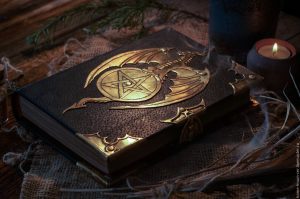From a Wiccan viewpoint, it is marvellous how the traditional names of days have survived all through the dark times. It is no secret that all seven days of the week have been named after Gods and Goddesses worshipped by the Old Tradition. Let’s explore the way we could bring a little magic in our everyday use.
According to modern Wicca traditions, all seven days of the week has different attributes and represent a certain element. It is down to you individually, how you use this information but it is believed that an understanding of the wheel of the week can bring a nice change to a hectic lifestyle.
The seven-day week was first introduced by ancient Egyptians, when according to Egyptian astrology they assigned a name to every day by the planet that was regent during the first hour of that particular day. As ancient Egyptian astrology knew only seven celestial bodies, we now have seven days of the week. But all this has also a deeper meaning not only within Wicca.
Sunday was named after Sunna – the Germanic goddess of the Sun. In modern Wicca traditions it is associated with all possible solar deities, it’s colour is yellow, orange and gold, Wiccan element: Fire, energy principle: Yang, magical number: 9, relates to healing, learning, authority and friendship spells.
Monday was named after Mani – the Germanic God of the Moon. It is, however, contrary to the modern Wicca beliefs as most of Wiccans regard the Moon as a female deity. Monday’s colours are white and silver, element: Water, energy principle: Yin, magical number: 3. It is a good day to execute spells concerning dreams, the home, intuition, spiritual growth and healing.
Tuesday is related to the Old Norse god Tyr and his equivalents Tuesto (Germanic head of the Pantheon) and Mars (Roman god of war). Tuesday’s colour is red, element: Fire, energy principle: Yang, magical number: 4. It is good for solving the conflicts and spells relating to courage, logic, physical strength and vitality.
Wednesday has its name presumably from Wodan, the Anglo Saxon god, who is thought to be equivalent of Odin in Old Norse Pantheon. However, non-English countries associate Wednesday with Mercury – the Roman god. Wednesday’s colour is grey and navy, Wiccan element: Earth, energy principle: Yin, magical number 3. Wednesday is used for divination and spells relating to insight, self-improvement and education.
Thursday was named after the Old Norse god of thunder – Thor. Its colour is purple, element: Fire, energy principle: Yang, magical number: 7. Thor’s day is associated with Jupiter and used for luck and money spells and magic workings concerning faithfulness and legal matters.
Friday is associated with Frigg or Freyja – the Old Norse goddess of love and fertility. Its planet is Venus, the Wiccan element is Air, energy principle: Yang, colour: blue and sometimes green, magical number: 6. Friday is good for love and fertility spells and it is regarded as the day of art and pleasure.
Saturday bears its name from the Roman agricultural god – Saturn. Its colours are brown, green and purple, in certain traditions – black. Saturday’s element is Earth, energy principle: Yin, magical number: 2. Saturday is the day for banishing spells, change and motivation. In some Wiccan traditions it is associated with death/reincarnation workings but this must be approached very carefully!
From the point of view of numerology, when you sum up all the magic numbers of the days of the week, it turns out to be 34 => 3+4 => 7. Another occurrence of the magic number 7?
To name at least some examples where 7 comes up as a sacred number: seven is widely used in Wicca as the number of power; there were seven palms in the Egyptian Sacred Cubit; 7 ranks in Mithraism; seven is the cornerstone of Cherokee cosmology. Buddha had to walk 7 steps at his birth; there are seven Sages in Sumerian and Hindu belief systems; in British Folk tradition every 7 years the Fairy Queen pays a tithe to Hel. The continent of Atlantis had seven main islands or parts.
Now, if you are interested in living according to this wheel of the week, you can start by planning your Wicca spells by the day of the week it relates to. Some Wiccans also like to choose their clothes and jewellery according to the colours of the week. It is all up to you. Wicca doesn’t teach that it is necessary or obligatory to live according to this scheme. Do it if you like it and if you find that it works for you.
You may also be interested in exploring the article about Wiccan Elements.
Where to Get the Best Wiccan Books?





I just thought that you might want to point out that Jupiter is a planet of increasing what you have, therefore you shouldn’t do a money spell if you’re broke, or else you’ll only get more poverty as a result.
Dear Priestess, that’s a really good point. I agree that you really have to be careful about money spells!